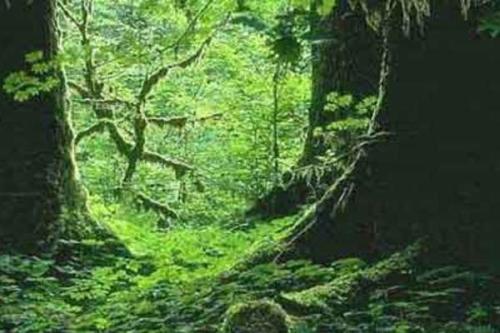(单词翻译:单击)
听力文本
This is Scientific American — 60-Second Science. I'm Christopher Intagliata.
In the fight to conserve tropical rainforests, here's a tool you don't often hear about: orange peels. Specifically, 12,000 tons of them, dumped on the land. "You don't usually associate waste disposal with biodiversity benefits, something that's good for the environment."
Tim Treuer is an ecologist at Princeton University, and he's talking about a unique conservation story. It started in the early 1990s, when an orange juice producer called Del Oro set up shop near the Guanacaste Conservation Area in Costa Rica, a region that contains several national parks and a wildlife refuge.
Del Oro needed somewhere to dump their orange peels, and the company also owned forested land abutting the parkland that it had no intention of cultivating. So a deal was struck: if Del Oro donated its forested land, it could dump orange peel waste on degraded pastureland within the conservation area.
A thousand dump trucks' worth of orange peels were scattered on the land in 1998. "And within about six months the orange peels had been converted from orange peels into this thick black loamy soil. Kind of passing through this gross stage in between of kind of sludgy stuff filled with fly larvae."

The result of that influx of nutrient-rich organic material? "I couldn't even find the site the first time I saw it." He couldn't find it because, over 16 years, the orange-peel waste had sent the land on a journey to become vine-choked jungle. Jungle with three times the diversity of tree species of the adjacent control plot, richer soil and a much denser canopy. In other words, the experiment was a success. The results appear in the journal Restoration Ecology.
Treuer says perhaps this lesson could be applied elsewhere. "It's a shame where we live in a world with nutrient-limited degraded ecosystems and also nutrient-rich waste streams. We'd like to see those things come together a little bit. That's not license for any agricultural company to just start dumping their waste products on protected areas, but it does mean that land managers, restorationists, people involved with industrial-scale agricultural operations should start thinking about ways to do thoughtful experimentation to see if in their particular system they can have similar win-win-win results."
That's actually "win-win-win"—a win for the company, a win for the protected area, and because the jungle packs away CO2, a win for the planet, too.
Thanks for listening for Scientific American — 60-Second Science Science. I'm Christopher Intagliata.
参考译文
这里是科学美国人——60秒科学。我是克里斯托弗·因塔利亚塔。
在热带雨林保护中,有一种不太常见的工具:橘子皮。具体来说,是倾倒在土地上的1.2万吨橘子皮。“通常人们不会将废物处理与生物多样性益处联系起来,而这种益处对环境有好处。”
蒂姆·特罗伊尔是普林斯顿大学的一位生态学家,他正在讲述一个独特的热带雨林保护故事。故事起源于上世纪90年代初,当时一位名叫德尔·奥罗的橘汁生产商在哥斯达黎加瓜那卡斯特保护区附近开了店,这一地区有多个国家公园和一个野生动物保护区。
德尔·奥罗需要能倾倒橘子皮的地方,刚好公司还拥有毗邻公园的林地,而且无意在林地耕种。所以,交易就此达成:如果德尔·奥罗捐出自己名下的林地,那公司就能在保护区内的退化牧场上倾倒橘子皮。
1998年,能装满一千辆卡车的橘子皮被倾倒在了那片土地上。“在大约6个月内,橘子皮就变成了这种丰厚肥沃的黑土。可以说是跳过了满是蛆虫的泥泞的恶心阶段。”
那倒满了营养丰富的有机物质的土地怎么样了?“第一次看到它时,我甚至都没找到倾倒橘子皮的地方。”他没能找到的原因是,16年过后,橘子皮废料已经让这片土地变成了爬满藤蔓的丛林。而这片丛林的树种多样性是相邻管控区的三倍,而且这里的土地更肥沃,树冠也更密集。换句话说,实验成功了。这项研究结果发表在《恢复生态学》期刊上。
特罗伊尔表示,也许这一经验可以用到其他地方。“令人遗憾的是,我们生活在营养有限的退化生态系统中,而我们排放的废水富含养分。我们想看到二者稍微结合一下。不过,这并不是允许任何农业公司开始向保护区倾倒废弃物,不过这的确意味着土地管理者、环境修复者以及参与大规模农业经营的人士应该开始思考治理方法,进行周密的试验,看看在他们各自的系统中是否能达到类似的三赢效果。”
这是“三赢”,即德尔·奥罗的公司获利,保护区受益,而且由于丛林吸收二氧化碳,所以地球也将受益。
谢谢大家收听科学美国人——60秒科学。我是克里斯托弗·因塔利亚塔。
译文为可可英语翻译,未经授权请勿转载!
重点讲解
重点讲解:
1. have no intention of 不想;不打算;
例句:We have no intention of giving up.
我们并没有放弃打算。
2. convert into (使)改变;更改;(使)转变;
例句:The solar cell can convert the energy of sunlight into electric energy.
太阳能电池能把阳光的能量转化为电能。
3. in other words 换言之;换句话说;也就是说;
例句:You can come here to work next Monday. In other words, you have been employed.
下周一你就可以来上班了。换句话说,你被录用了。
4. be involved with 涉及;
例句:She's very closely involved with our work.
她在很大程度上参与到我们的工作中来了。


